|
|
|
Sort Order |
|
|
|
Items / Page
|
|
|
|
|
|
|
| Srl | Item |
| 1 |
ID:
173437
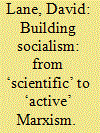

|
|
|
|
|
| Summary/Abstract |
Historical materialism envisages law-like tendencies (‘scientific’ Marxism) promoting the development of productive forces and, concurrently, a political praxis (‘active’ Marxism) requiring human intervention. These positions give rise to conflicting interpretations of Marxism: first to understand society, second to change it – to abolish economic exploitation. The twentieth century witnessed a shift in the locus of the contradictions of capitalism to the economically dependent territories of the imperial powers. Socialist parties, when in power and adopting a Leninist political praxis, furthered modernisation and were successful in reducing economic exploitation. The paper addresses the relationship between the scientific and praxis components of Marxism in contemporary global capitalism. It considers post-Marxist interpretations of the changing class structure, the rise of identity politics and the evolving nature of capital. Forms of domination, oppression and discrimination (bureaucracy, patriarchy, racism, militarism and credentialism) give rise to their own distinctive forms of power relations. It is contended that they should not be equated with Marx’s crucial insight into the nature of economic exploitation. Many current Marxist (and ‘post-Marxist’) writers adopt a ‘scientific’ position emphasising the inherent contradictions of capitalism. The author claims that without appropriate political praxis, the resolution of such contradictions is unlikely to transcend capitalism.
|
|
|
|
|
|
|
|
|
|
|
|
|
|
|
|
| 2 |
ID:
180353
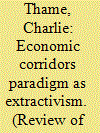

|
|
|
|
|
| Summary/Abstract |
Economic corridors are under construction across the planet. Trillions of dollars are being spent and they will have significant implications for international politics and, ultimately, world order. However, there has been limited conceptual work on them to date, especially in International Relations. This article contributes to that gap by explaining the dominant rationale before offering a conceptualisation of economic corridors as an essentially extractivist paradigm. This counter-hegemonic proposition revolves around four relational theses: (1) economic corridors are a ‘fix’ for crises of capitalism; (2) economic corridors exacerbate class struggle; (3) economic corridors are tools for exploitation; (4) economic corridors facilitate financial extraction. In so doing it unmasks the dominant rationale as ideological cover for valorisation and accumulation based on extractive and exploitative relations with human and extra-human nature. Rather than contributing to inclusive and sustainable development as proponents claim, the article contends economic corridors reinforce power asymmetries between states, countries, and classes, thereby extending and entrenching processes of uneven and combined development. The argument is substantiated with empirical reference to mainland Southeast Asia but aims to advance understanding of extractive dynamics integral to the concept of economic corridors and hence operative worldwide.
|
|
|
|
|
|
|
|
|
|
|
|
|
|
|
|
| 3 |
ID:
144557


|
|
|
|
|
| Summary/Abstract |
This article explores the acceptance of Marxism by a non-Marxist Chinese philosopher, Feng Youlan, before and after 1949. Previous studies have largely focused on establishment intellectuals in the study of Marxism and intellectuals in China, and this article seeks to fill the lacuna on the intellectual potential Marxism offered to non-Communist intellectuals in China. This article finds that for Feng Youlan, a non-Marxist Chinese intellectual, Marxism was able to provide meaningful venues for his attempt to modernize Chinese knowledge and transform Chinese culture. A Marxist emphasis on universal rules governing all human societies on the same stage of development, Marxist presentist approaches to history, and most of all, a Marxist emphasis on praxis, aided Chinese intellectuals like Feng in constructing new approaches to learning the Chinese past. The Marxist emphasis on praxis helped deepen the discussion of experience, a concept central to a reconstruction of Confucian learning in modern China, after the Communist takeover of China in 1949. Eventually the state monopoly of the definition of Marxist praxis stifled the spontaneous search for a new understanding of experience in Communist China. Nonetheless, Marxism had a transformative and lasting impact on modern Chinese scholarship, as seen from the example of Feng Youlan.
|
|
|
|
|
|
|
|
|
|
|
|
|
|
|
|
| 4 |
ID:
112569
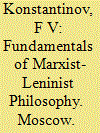

|
|
|
|
|
| Publication |
Moscow, Progress Publishers, 1982.
|
| Description |
480p.Hbk
|
|
|
|
|
|
|
|
|
|
|
|
Copies: C:1/I:0,R:0,Q:0
Circulation
| Accession# | Call# | Current Location | Status | Policy | Location |
| 056460 | 335.411/KON 056460 | Main | On Shelf | General | |
|
|
|
|
| 5 |
ID:
025989


|
|
|
|
|
| Publication |
Oxford, Basil Blackwell, 1982.
|
| Description |
204p.Pbk
|
| Standard Number |
0631125655
|
|
|
|
|
|
|
|
|
|
|
|
Copies: C:1/I:0,R:0,Q:0
Circulation
| Accession# | Call# | Current Location | Status | Policy | Location |
| 020863 | 910.133/QUA 020863 | Main | On Shelf | General | |
|
|
|
|
| 6 |
ID:
178128


|
|
|
|
|
| Summary/Abstract |
This forum brings together critical engagements with Andreas Bieler and Adam David Morton’s Global Capitalism, Global War, Global Crisis to assess the prospects and limits of historical materialism in International Studies. The authors’ call for a ‘necessarily historical materialist moment’ in International Studies is interrogated by scholars working with historical materialist, feminist and decolonial frameworks in and beyond International Relations (IR)/International Political Economy (IPE). This introductory essay situates the book in relation to the wider concerns of historical materialist IR/IPE and outlines how the contributors assess the viability of Bieler and Morton’s historical materialist project.
|
|
|
|
|
|
|
|
|
|
|
|
|
|
|
|
| 7 |
ID:
120475
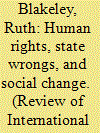

|
|
|
|
|
| Publication |
2013.
|
| Summary/Abstract |
This article demonstrates the significance of human rights for challenging state violence and terrorism. It is intended to enhance understanding of the concept of emancipation. Critical Security Studies has tended to focus on the individual as the agent of her/his own liberation. Yet many victims of oppression are not able to free themselves. Drawing on historical materialism, it is argued that collective agency on behalf of the oppressed has a necessary role to play in emancipatory politics. Emancipation is contingent on the capacity of specific agents, located socially and historically, to identify practices that might bring about change, structures that might be transformed, and appropriate agents that are in the best position to facilitate such change. This article shows how such collective social action has forced a reversal of some of the Bush administration's repressive policies, and has partially succeeded in curtailing the arbitrary use of US state power. This has been achieved through the national and international human rights architecture. Therefore, Marxian claims that human rights should be eschewed are mistaken, since they fail to acknowledge the emancipatory potential of human rights, the opportunities they provide for collective social action, and the role they can play in transformative social change.
|
|
|
|
|
|
|
|
|
|
|
|
|
|
|
|
| 8 |
ID:
040516


|
|
|
|
|
| Publication |
London, Allen Lane the Penguin press, 1970.
|
| Description |
187p.Hbk
|
| Standard Number |
0713901292
|
|
|
|
|
|
|
|
|
|
|
|
Copies: C:1/I:0,R:0,Q:0
Circulation
| Accession# | Call# | Current Location | Status | Policy | Location |
| 004871 | 923.343/FIS 004871 | Main | On Shelf | General | |
|
|
|
|
| 9 |
ID:
109977


|
|
|
|
|
| Publication |
2011.
|
| Summary/Abstract |
The People of Puerto Rico occupies an ambivalent place in both the genealogy of anthropological theory and the understanding of Puerto Rican society. Its co-authors collectively developed a uniform and complex conceptual scheme which expressed both convergence and divergence among them. The book furthered Marxist approaches in U.S. anthropology and was the first serious scholarly materialist analysis of Puerto Rico. While privileging the lives of common people, it fell short of representing important strains of Puerto Rican diversity and socio-historical dynamics. The Puerto Rico Social Anthropology Project used four different models to explain the genesis of cultural forms and the interrelations among aspects of society/culture, in a given, homogeneous, "subculture" or "socio-cultural segment" of a complex society. The Project's members stressed a linear-utilitarian analysis of these subcultures, but where they could not account for observed cultural forms with such an approach, they appealed to the culture-psychology relation. This article considers the four interlinked paradigms, the associated analysis of socio-cultural trends, the resulting problematic theoretical consequences, and the flawed Marxism of the work.
|
|
|
|
|
|
|
|
|
|
|
|
|
|
|
|
| 10 |
ID:
045114


|
|
|
|
|
| Publication |
Cambridge, Polity Press, 1985.
|
| Description |
vi, 399p.
|
| Contents |
B
|
| Standard Number |
074560031X
|
|
|
|
|
|
|
|
|
|
|
|
Copies: C:2/I:0,R:0,Q:0
Circulation
| Accession# | Call# | Current Location | Status | Policy | Location |
| 026582 | 335.4119/GID 026582 | Main | On Shelf | General | |
| 058204 | 335.4119/GID 058204 | Main | On Shelf | General | |
|
|
|
|
| 11 |
ID:
193011


|
|
|
|
|
| Summary/Abstract |
In Fi al-adab al-sahyuni (On Zionist Literature, 1967)Footnote1, the Palestinian writer and Popular Front for the Liberation of Palestine (PFLP) spokesperson Ghassan Kanafani provides an analysis of Zionist literary production from the early nineteenth century through the mid-twentieth century, situating it in a broader schema of Western imperialism, settler colonialism, and dispossession in Palestine. Through a treatment of the early Zionist texts, Kanafani’s study traces the evolution of literary representations of the Jewish subject and explores their utility in repudiating integration and advancing racial supremacist logics. The Zionist works in question venerate different relationships to land—extractive, romantic, fraudulent—in contrast to those of Palestinian literary and oral traditions; the former are connected to the ongoing, material efforts of colonizing Palestine. Kanafani’s study was drafted in Beirut and is a reflection of the broader sweep of Arab nationalist and anti-colonial cultural production during the 1960s and 1970s, which was targeted by an anti-communist West. These experiences were formative for Kanafani’s intellectual project, which sees literary criticism as a revolutionary tool and a direct extension of armed resistance, whereby a cultural reconstitution can be used in service of liberating both Palestinian land and people. Kanafani’s study suggests that the “weapons” of literary production will be most effectively brandished by the Arab youth who lead the struggle against Zionism.
|
|
|
|
|
|
|
|
|
|
|
|
|
|
|
|
| 12 |
ID:
162501


|
|
|
|
|
| Summary/Abstract |
Coordinating defence-industrial relations towards harmonising and facilitating procurement policies, production processes and the joint operability of their member-states’ national defence sectors, International Armaments Organisations (IAOs) play an important role in armaments cooperation. How can we explain their institutional development? Existing literature tackles this question using International Relations theories to mid-range theories of institutions and integration. However, they adopt overly state-centric viewpoints, assume actor interests as given, and disregard the changes in the global economic landscape that constitute the backdrop of armaments cooperation. In response, we shift the focus onto a key group of actors: the defence firms. Using a Neo-Gramscian Historical Materialist approach, we investigate how the globalisation of the defence market has created a transnational defence-industrial class in Europe, and demonstrate how its economic interests have fundamentally shaped the institutional frameworks of European IAOs. We focus on the Organisation for Joint Armaments Cooperation (OCCAR) and the European Defence Agency (EDA) to illustrate our argument. Our conclusions have implications for the study of armaments cooperation, particularly highlighting how the economic nature of this policy domain necessitates a closer look at the global and regional production relations, and the agency of the defence firms.
|
|
|
|
|
|
|
|
|
|
|
|
|
|
|
|
| 13 |
ID:
107557


|
|
|
|
|
| Publication |
2011.
|
| Summary/Abstract |
Fred Halliday's life and work were intimately associated with the theory and practice of internationalism. In his later writings, the notion of 'complex solidarity' emerges as a key component of Halliday's worldview. This article explores the conceptual interconnections between different historical expressions of internationalism, cosmopolitanism and solidarity. It considers the intricate relationship between these categories and their place in our understanding of international affairs, emphasizing the divergence between liberal and revolutionary conceptions of internationalism and cosmopolitanism. The article discusses diverse understandings of 'solidarity' in International Relations, arguing that beyond the cosmopolitan and communitarian approaches, there exist other 'Grotian' and 'republican' ideas of solidarity. Halliday drew on these to present his own defence of universal human rights and solidarity, arguably developing a distinctive brand of republican internationalism. The latter part of the article gives content to 'complex solidarity' by suggesting it is built on three inter-related components: a methodological internationalism, an egalitarian reciprocity and a critique of global capitalism. Overall, these guiding features of complex solidarity deliver a unique rendition of internationalism which reflect Halliday's eclectic combination of radical liberalism with a residual historical materialism.
|
|
|
|
|
|
|
|
|
|
|
|
|
|
|
|
| 14 |
ID:
111593
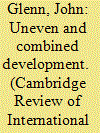

|
|
|
|
|
| Publication |
2012.
|
| Summary/Abstract |
Although Justin Rosenberg's academic writings have from the very beginning attempted to provide an alternative to neorealism in the form of Trotsky's theory of uneven and combined development (U&CD), his attempts at actually replacing it with a general theory of his own have been relatively recent. His initial attempts raised much interest and several responses. In his latest paper, 'Basic problems in the theory of uneven and combined development, part II: unevenness and political multiplicity' (Cambridge Review of International Affairs, 23:1, 2010, 165-189), Rosenberg acknowledges that in actual fact, despite his attempts to provide an alternative to neorealism, his own theory presupposed political multiplicity, and therefore in his latest article he has sought to rectify this by providing an account of the emergence of 'politically fragmented space' which is explicitly grounded in historical materialism (Pozo-Martin, Cambridge Review of International Affairs, 20:4, 2007, 554). As such, it is to be welcomed. However, this article argues that if we are to accept Rosenberg's theory of the emergence of multiplicity then it must provide a better explanation than other competing accounts. By using an alternative explanation of the rise of the international, this article demonstrates that Rosenberg's paper has failed to do this, and instead argues for the existence of a transhistorical anarchic environment arising from social rather than political multiplicity. However, U&CD is then used to explain both the intra- and inter-societal stratifications (the latter in terms of distributional structure) that arise. Associated with these stratifications is the inextricable intertwining of the modes of production and modes of inter-state competition. From this combination emerges the general tendencies of societal development, which then need to be applied to the concrete circumstances of history. In so doing, we need to account for the different analytical registers of genesis, structure, epoch and conjuncture and the unique concatenation of factors that pertain for each of these (Callinicos, International Politics, 6:3, 2005, 362).
|
|
|
|
|
|
|
|
|
|
|
|
|
|
|
|
| 15 |
ID:
113811
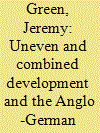

|
|
|
|
|
| Publication |
2012.
|
| Summary/Abstract |
This article attempts to situate the approach to World War I within the context of the uneven and combined development of 19th-century European capitalism. Through a comparative analysis of German and British development within the context of the epochal transition from feudalism to capitalism, the article proposes that existing historical materialist and Realist understandings of the roots of World War 1 are inadequate. Realist analyses, stressing the primacy of 'geopolitics', fail to provide a convincing explanation of the precise origins of German bellicosity. Instead they assume that expansionist German behaviour was an inevitable consequence of systemic anarchy. Historical materialist accounts, preferring a sociological explanation, overstate the importance of systemic capitalist crisis and the European-wide escalation of class struggle for understanding the genesis of the war. Utilizing Trotsky's concept of uneven and combined development, I contend, enables a more comprehensive understanding of the origins of the conflict.
|
|
|
|
|
|
|
|
|
|
|
|
|
|
|
|
|
|
|
|
|